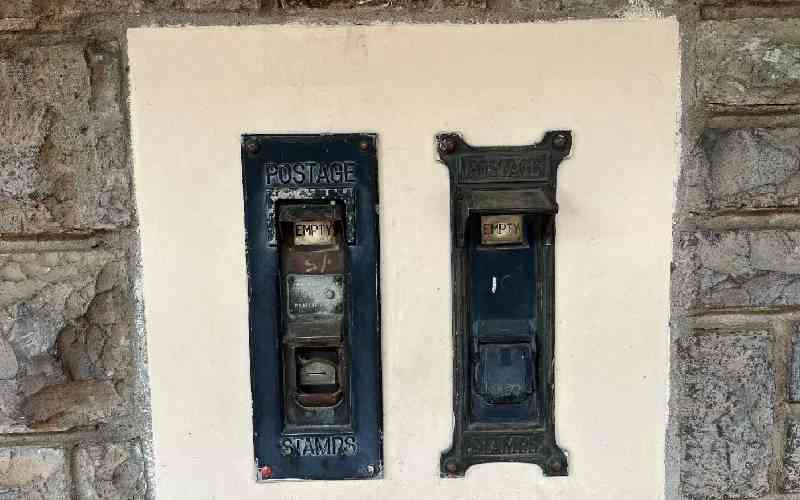
Remnants of the post office stamp dispenser at UoN Main campus. [XN Iraki]
Next time you visit the University of Nairobi, get to Taifa Hall, formerly Gloucester Hall. Get in from the fountain of knowledge side.
Check to the left of the door facing the Mahatma Gandhi Statue. It’s unfortunate we have violent protests in Kenya with such a statue around. But we have polluted rivers with the United Nations Environment Programme (Unep) headquarters.
You will find an old stamp dispenser on the wall. Its colour has changed, courtesy of time and weather. It shows empty. When letter writing enjoyed its golden age, one simply inserted a coin and got a stamp before heading to a post office.
Few of the Gen Zs have sent a letter through the post office. The last items to go through the post office were dividend cheques and school report forms.
Not anymore, dividends are paid through M-Pesa or a bank. School report forms are accessed online. Do we appreciate how far we have come technologically? Could the scant use of technology be making learning boring for our students, the digital natives?
The post office is a perplexing institution; it’s known for innovations but also its deaths. We are just seeing self-dispensing kiosks around airports, malls, and other public places.
Insert a coin or a note, and you get a soda or a snack. We think they are new. The post office was more than 50 years ahead of its time with stamp dispensers.
The other post office innovation was branchless banking. We all owned post office bank accounts and the famous yellowish book that allowed one to withdraw money from any post office in the country.
That was long before banks were branchless and computers found their way to banking halls. Now with ATMs, you can withdraw money from other banks or do it online.
Later, the post office came up with expedited mail service (EMS), and you would get your parcel the next day.
We should not forget money orders and telegrams! The post office was the first pioneer of email; I used it. And your phone number is the post office number? How did it work?
It’s a paradox that these innovations were not scaled up. Was it bureaucracy or too much government support? Or did we think the post office was forever?
I would love to talk to someone who has worked in the post office all his or her life. But I do recall at one time the post office got lots of new employees. Was that a factor in failing to capitalise on these innovations?
Curiously, entrepreneurs took the cue and commercialised what the post office was doing. They are quicker to commercialise than the public sector. Lots of parcel companies, some foreign, took over most of the post office work. Think of DHL, FedEx or even matatu Saccos.
Stay informed. Subscribe to our newsletter
Amazon did it perfectly. They realised that just like letters, they could deliver your merchandise to your doorstep or designated places.
When are our post offices becoming the logistics arm of e-commerce? They have a countrywide network.
Post offices' best bet is to become Huduma Centres and go a step further and deliver the IDs, passports and other vital documents to their owners.
The age of letter writing is over; the post office must shift to new frontiers. Just a minute, maybe they can learn from traditional watchmakers. How did they defend their market against the digital onslaught?
In a clever move that should be emulated, the invention of digital watches made the traditional watches more precious, a status symbol. Seen any affluent Kenyan wearing an electronic watch? They keep laughing at my digital Casio.
Phones are trying to emulate watch makers. Some Kenyans, including myself, own an old phone (dumb phone). It gives me peace, away from a forever networked smartphone.
Such phones, post office boxes and phone booths are common in the developed countries. There is something sentimental about such antiques.
And not everyone moves with time. Think of an 80-year-old man and the digital age, he could be well educated. Don’t we still visit banks despite M-Pesa and online banking?
Would the post office do the same, make letter writing cool again, a shift from instant messages? Cards, flowers, gifts and parcels shall never become virtual.
I have never forgotten the excitement of receiving letters in high school. No SMS or email has excited me that much.
We should not close post offices; we can reinvent them. Will that happen in private hands or public hands?
As early as 2400 BC, we had Egyptians using the mail system. One of the world’s oldest post offices was started in 1712 in Scotland.
With such longevity, should we really let the post office be blown by Schumpeter’s gale of creative destruction? What do you think?







